- Joined
- Apr 28, 2009
- Messages
- 345
- Points
- 18
https://edition.cnn.com/2018/06/07/asia/trump-kim-summit-china-outcomes-intl/index.html
China must beware of summit's unintended consequences

By Brad Lendon, CNN
Updated 2342 GMT (0742 HKT) June 7, 2018
Current Time 0:02
/
Duration Time 2:02
Now Playing Why Singapore was...
US-North Korea: Where do we go from here?
Trump: N. Korea summit could still be on
Trump on NK summit: We're moving along
Trump: Kim changed attitude after chat with Xi
Uncertainty surrounds US, North Korea summit
Trump aides skeptical Kim summit will happen
Trump: Kim will get protections if deal made
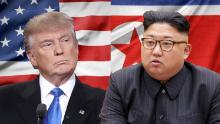
Now Playing
Why Singapore was chosen for Trump-Kim summit

First lady will not go to G7, N. Korea summits
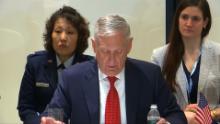
Mattis: Sanctions stay until denuclearization

Who will pay for North Korea's hotel bill?
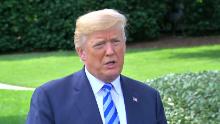
Trump: N. Korea summit will go on as scheduled
Trump: North Korea talks going very well
Trump: Having productive talks with N. Korea
US-North Korea: Where do we go from here?
Trump: N. Korea summit could still be on
Trump on NK summit: We're moving along
Trump: Kim changed attitude after chat with Xi
Uncertainty surrounds US, North Korea summit
Trump aides skeptical Kim summit will happen
Trump: Kim will get protections if deal made

Why Singapore was chosen for Trump-Kim summit

First lady will not go to G7, N. Korea summits

Mattis: Sanctions stay until denuclearization

Who will pay for North Korea's hotel bill?

US admiral: China is our biggest challenge 01:27
With responsibility for protecting South Korea reduced, those forces could be used to project US power in other parts of the Asia-Pacific such as Japan, Singapore, Australia and the Philippines -- and in doing so, place a renewed focus on countering Chinese influence in the region.
"US forces won't simply pack up and go home," said Wallace.
Beijing must also be wary its longtime ally in Pyongyang doesn't gravitate toward a new friend in Washington.
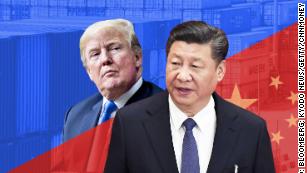
Report: US still wields most power in Asia
"Rapprochement could harm China's interests if North Korea starts making decisions that prioritize US over Chinese preferences to maintain good ties," Heath said.
"Like every country in Asia, North Korea has an incentive to seek warmer ties with the US to balance against Chinese power."
For instance, North Korea might be able to negotiate better trade deals with the US and the West than it currently receives from China, its biggest trading partner.
Sam Roggeveen, an analyst at Australia's Lowy Institute, says North Korea's claims to be able to fire nuclear-armed missiles as far as New York or Chicago gives China another advantage, by creating uncertainty between US allies as to whether the US would truly back them up if they were attacked.
Japan and South Korea need to ask themselves, "Would the US risk losing a major city in our defense?" Roggeveen said. "The answer is no."
China can then, in theory, parlay those doubts into whether the US would come to the aid of Japan in relation to the contested Senkaku/Diaoyu island chain in the East China Sea, or even whether the US would defend Taiwan if China moved on it militarily, analysts say.
Remove those doubts, and the US' regional alliance becomes more secure, especially when faced with a common threat.
And whereas North Korea is a threat to North Asian countries, China's influence extends across Asia, potentially drawing more countries into the US' orbit.
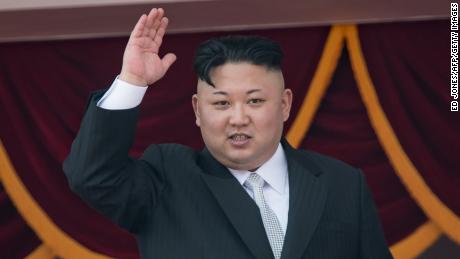
Kim Jong Un reaffirms denuclearization push 05:01
But Wallace says there's one summit outcome that could be a nightmare for both China and the US alliance network -- a partial denuclearization where North Korea gives up the long-range missiles that could hit the US mainland but keeps shorter range ones that could still threaten Japan and South Korea.
That could encourage both those US allies to develop their own nuclear arms programs, precipitating an arms race in North Asia.
And there is wide agreement that more nations in the region pursuing nuclear capability would be destabilizing.
"This could have all sorts of cascading effects of which the outcomes are hard to predict," Wallace said.
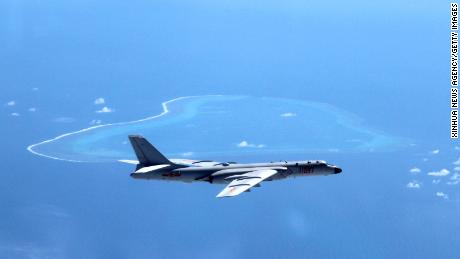
The West may be too late to stop Beijing in S. China Sea, says analyst 05:13
So what might be the best result for Beijing when the Trump-Kim summit ends?
"A summit which produces nothing tangible, but lowers the temperature" in the region, Roggeveen said.
That's because with the US preoccupied with the North Korea issue, China can continue what it has been doing for the past several years: fortifying its positions in the South China Sea, increasing diplomatic pressure and military exercises around Taiwan, having its ships and aircraft challenge Japan's island claims in the East China Sea, and building and modernizing its armed forces, while forging deeper economic ties around the Asia-Pacific.
At the moment, China sees North Korea's nuclear program to be a "useful tool for its larger purpose," said Roggeveen, "to undermine America's claims to be the strategic power in Asia and take that mantle for itself."
CNN's Joshua Berlinger contributed to this report.
China must beware of summit's unintended consequences

By Brad Lendon, CNN
Updated 2342 GMT (0742 HKT) June 7, 2018
Current Time 0:02
/
Duration Time 2:02
Now Playing Why Singapore was...
US-North Korea: Where do we go from here?
Trump: N. Korea summit could still be on
Trump on NK summit: We're moving along
Trump: Kim changed attitude after chat with Xi
Uncertainty surrounds US, North Korea summit
Trump aides skeptical Kim summit will happen
Trump: Kim will get protections if deal made

Now Playing
Why Singapore was chosen for Trump-Kim summit

First lady will not go to G7, N. Korea summits

Mattis: Sanctions stay until denuclearization

Who will pay for North Korea's hotel bill?

Trump: N. Korea summit will go on as scheduled
Trump: North Korea talks going very well
Trump: Having productive talks with N. Korea
US-North Korea: Where do we go from here?
Trump: N. Korea summit could still be on
Trump on NK summit: We're moving along
Trump: Kim changed attitude after chat with Xi
Uncertainty surrounds US, North Korea summit
Trump aides skeptical Kim summit will happen
Trump: Kim will get protections if deal made

Why Singapore was chosen for Trump-Kim summit

First lady will not go to G7, N. Korea summits

Mattis: Sanctions stay until denuclearization

Who will pay for North Korea's hotel bill?

US admiral: China is our biggest challenge 01:27
With responsibility for protecting South Korea reduced, those forces could be used to project US power in other parts of the Asia-Pacific such as Japan, Singapore, Australia and the Philippines -- and in doing so, place a renewed focus on countering Chinese influence in the region.
"US forces won't simply pack up and go home," said Wallace.
Beijing must also be wary its longtime ally in Pyongyang doesn't gravitate toward a new friend in Washington.

Report: US still wields most power in Asia
"Rapprochement could harm China's interests if North Korea starts making decisions that prioritize US over Chinese preferences to maintain good ties," Heath said.
"Like every country in Asia, North Korea has an incentive to seek warmer ties with the US to balance against Chinese power."
For instance, North Korea might be able to negotiate better trade deals with the US and the West than it currently receives from China, its biggest trading partner.
Sam Roggeveen, an analyst at Australia's Lowy Institute, says North Korea's claims to be able to fire nuclear-armed missiles as far as New York or Chicago gives China another advantage, by creating uncertainty between US allies as to whether the US would truly back them up if they were attacked.
Japan and South Korea need to ask themselves, "Would the US risk losing a major city in our defense?" Roggeveen said. "The answer is no."
China can then, in theory, parlay those doubts into whether the US would come to the aid of Japan in relation to the contested Senkaku/Diaoyu island chain in the East China Sea, or even whether the US would defend Taiwan if China moved on it militarily, analysts say.
Remove those doubts, and the US' regional alliance becomes more secure, especially when faced with a common threat.
And whereas North Korea is a threat to North Asian countries, China's influence extends across Asia, potentially drawing more countries into the US' orbit.

Kim Jong Un reaffirms denuclearization push 05:01
But Wallace says there's one summit outcome that could be a nightmare for both China and the US alliance network -- a partial denuclearization where North Korea gives up the long-range missiles that could hit the US mainland but keeps shorter range ones that could still threaten Japan and South Korea.
That could encourage both those US allies to develop their own nuclear arms programs, precipitating an arms race in North Asia.
And there is wide agreement that more nations in the region pursuing nuclear capability would be destabilizing.
"This could have all sorts of cascading effects of which the outcomes are hard to predict," Wallace said.

The West may be too late to stop Beijing in S. China Sea, says analyst 05:13
So what might be the best result for Beijing when the Trump-Kim summit ends?
"A summit which produces nothing tangible, but lowers the temperature" in the region, Roggeveen said.
That's because with the US preoccupied with the North Korea issue, China can continue what it has been doing for the past several years: fortifying its positions in the South China Sea, increasing diplomatic pressure and military exercises around Taiwan, having its ships and aircraft challenge Japan's island claims in the East China Sea, and building and modernizing its armed forces, while forging deeper economic ties around the Asia-Pacific.
At the moment, China sees North Korea's nuclear program to be a "useful tool for its larger purpose," said Roggeveen, "to undermine America's claims to be the strategic power in Asia and take that mantle for itself."
CNN's Joshua Berlinger contributed to this report.
